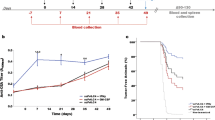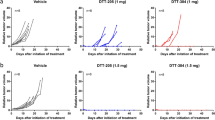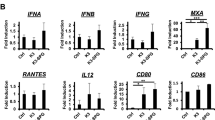Abstract
In this study, we investigated the therapeutic efficacy of a replication-conditional mutant HSV, G207, for the treatment of liver metastasis of colon carcinoma. Three liver metastasis models in syngeneic BALB/c mice were developed: (i) splenic injection, (ii) splenic and subcutaneous (s.c.) injection, and (iii) orthotopic implantation of CT26 colon carcinoma. In the splenic injection model, G207 was injected into the established splenic tumor on day 7. In the splenic and s.c. injection model, G207 were injected into the established s.c. tumor on days 5 and 8. In the orthotopic implantation model, a piece of CT26 tumor tissue was transplanted onto the wall of the cecum and G207 was injected in the established cecum tumor on day 7. On day 21 or 28, animals were sacrificed and liver metastases were evaluated. In all three models in immunocompetent mice, liver metastases were significantly reduced by intratumoral inoculation with G207 compared to the control. In athymic mice, however, there was no significant therapeutic effect of intratumoral inoculation with G207 on liver metastases. Tumor-specific cytotoxic T-lymphocyte responses were induced in mice treated with G207 in the orthotopic implantation model. These results suggest that intratumoral inoculation of G207, as an in situ cancer vaccine, can be an effective approach against liver metastasis of colon cancer and the efficacy involves tumor-specific T-cell responses.
This is a preview of subscription content, access via your institution
Access options
Subscribe to this journal
Receive 12 print issues and online access
$259.00 per year
only $21.58 per issue
Buy this article
- Purchase on Springer Link
- Instant access to full article PDF
Prices may be subject to local taxes which are calculated during checkout






Similar content being viewed by others
References
Brand MI, Saclarides TJ, Dobson HD et al. Liver resection for colorectal cancer: liver metastases in the aged Am Surg 2000 66: 412–416
de Brauw LM, van de Velde CJ, Bouwhuis-Hoogerwerf ML et al. Diagnostic evaluation and survival analysis of colorectal cancer patients with liver metastases J Surg Oncol 1987 34: 81–86
Ballantyne GH, Quin J . Surgical treatment of liver metastases in patients with colorectal cancer Cancer 1993 71: 4252–4266
Stangl R, Altendorf-Hofmann A, Charnley RM et al. Factors influencing the natural history of colorectal liver metastases Lancet 1994 343: 1405–1410
Chou J, Kern ER, Whitley RJ et al. Mapping of herpes simplex virus-1 neurovirulence to gamma 134.5, a gene nonessential for growth in culture Science 1990 250: 1262–1266
Mineta T, Rabkin SD, Yazaki T et al. Attenuated multi-mutated herpes simplex virus-1 for the treatment of malignant gliomas Nat Med 1995 1: 938–943
Goldstein DJ, Weller SK . Factor(s) present in herpes simplex virus type 1–infected cells can compensate for the loss of the large subunit of the viral ribonucleotide reductase: characterization of an ICP6 deletion mutant Virology 1988 166: 41–51
Toda M, Rabkin SD, Martuza RL . Treatment of human breast cancer in a brain metastatic model by G207, a replication-competent multimutated herpes simplex virus 1 Hum Gene Ther 1998b 9: 2177–2185
Toda M, Rabkin SD, Kojima H et al. Herpes simplex virus as an in situ cancer vaccine for the induction of specific anti-tumor immunity Hum Gene Ther 1999 10: 385–393
Carew JF, Kooby DA, Halterman MW et al. Selective infection and cytolysis of human head and neck squamous cell carcinoma with sparing of normal mucosa by a cytotoxic herpes simplex virus type 1 (G207) Hum Gene Ther 1999 10: 1599–1606
Kooby DA, Carew JF, Halterman MW et al. Oncolytic viral therapy for human colorectal cancer and liver metastasis using a multi-mutated herpes simplex virus type-1 (G207) FASEB J 1999 13: 1325–1334
Lee JH, Federoff HJ, Schoeniger LO . G207, modified herpes simplex virus type 1, kills human pancreatic cancer cells in vitro J Gastrointest Surg 1999 3: 127–133
Walker JR, McGeagh KG, Sundaresan P et al. Local and systemic therapy of human prostate adenocarcinoma with the conditionally replicating herpes simplex virus vector G207 Hum Gene Ther 1999 10: 2237–2243
Todo T, Rabkin SD, Sundaresan P et al. Systemic antitumor immunity in experimental brain tumor therapy using a multimutated, replication-competent herpes simplex virus Hum Gene Ther 1999 10: 2741–2755
Toda M, Martuza RL, Kojima H et al. In situ cancer vaccination: an IL-12 defective vector/replication-competent herpes simplex virus combination induces local and systemic antitumor activity J Immunol 1998 160: 4457–4464
Fearon ER, Itaya T, Hunt B et al. Induction in a murine tumor of immunogenic tumor variants by transfection with a foreign gene Cancer Res 1988 48: 2975–2980
Wang M, Bronte V, Chen PW et al. Active immunotherapy of cancer with a nonreplicating recombinant fowlpox virus encoding a model tumor-associated antigen J Immunol 1995 154: 4685–4692
Huang AYC, Gulden PH, Woods AS et al. The immunodominant major histocompatibility complex class I–restricted antigen of a murine colon tumor derives from an endogenous retroviral gene product Proc Natl Acad Sci USA 1996 93: 9730–9735
Roth C, Rochlitz C, Kourilsky P . Immune response against tumors Adv Immunol 1994 57: 281–351
Brattain MG, Strobel-Stevens J, Fine D et al. Establishment of mouse colonic carcinoma cell lines with different metastatic properties Cancer Res 1980 40: 2142–2146
Alfieri AA, Hahn EW . An in situ method for estimating cell survival in a solid tumor Cancer Res 1978 38: 3006–3011
Kozlowski JM, Fidler IJ, Campbell D et al. Metastatic behavior of human tumor cell lines grown in the nude mouse Cancer Res 1984 44: 3522–3529
Fu XY, Besterman JM, Monosov A et al. Models of human metastatic colon cancer in nude mice orthotopically constructed by using histologically intact patient specimens Proc Natl Acad Sci USA 1991 88: 9345–9349
Markert JM, Medlock MD, Rabkin SD et al. Conditionally replicating herpes simplex virus mutant, G207 for the treatment of malignant glioma: results of a phase I trial Gene Ther 2000 7: 867–874
Bischoff JR, Kirn DH, Williams A et al. An adenovirus mutant that replicates selectively in p53-deficient human tumor cells Science 1996 274: 373–376
Khuri FR, Nemunaitis J, Ganly I et al. A controlled trial of intratumoral ONYX-015, a selectively-replicating adenovirus, in combination with cisplatin and 5-fluorouracil in patients with recurrent head and neck cancer Nat Med 2000 6: 879–885
Nemunaitis J, Ganly I, Khuri F et al. Selective replication and oncolysis in p53 mutant tumors with ONYX-015, an E1B-55kD gene–deleted adenovirus, in patients with advanced head and neck cancer: a phase II trial Cancer Res 2000 60: 6359–6366
Yazaki T, Manz HJ, Rabkin SD et al. Treatment of human malignant meningiomas by G207, a replication-competent multimutated herpes simplex virus 1 Cancer Res 1995 55: 4752–4756
Hunter WD, Martuza RL, Feigenbaum F et al. Attenuated, replication-competent herpes simplex virus type 1 mutant G207: safety evaluation of intracerebral injection in nonhuman primates J Virol 1999 73: 6319–6326
Oyama M, Ohigashi T, Hoshi M et al. Intravesical and intravenous therapy of human bladder cancer by the herpes vector G207 Hum Gene Ther 2000 11: 1683–1693
Toda M, Martuza RL, Rabkin SD . Tumor growth inhibition by intratumoral inoculation of defective herpes simplex virus vectors expressing granulocyte–macrophage colony-stimulating factor Mol Ther 2000 2: 324–329
Toda M, Martuza RL, Rabkin SD . Combination suicide/cytokine gene therapy as adjuvants to a defective herpes simplex virus–based cancer vaccine Gene Ther 2001 8: 332–339
McLemore TL, Liu MC, Blacker PC et al. Novel intrapulmonary model for orthotopic propagation of human lung cancers in athymic nude mice Cancer Res 1987 47: 5132–5140
Ahlering TE, Dubeau L, Jones PA . A new in vivo model to study invasion and metastasis of human bladder carcinoma Cancer Res 1987 47: 6660–6665
Miller FR, McInerney D . Epithelial component of host–tumor interactions in the orthotopic site preference of a mouse mammary tumor Cancer Res 1988 48: 3698–3701
Acknowledgements
We thank Robert L Martuza and Samuel D Rabkin (Harvard Medical School) for critical comments on the manuscript and Akira Ohno for his technical assistance. This study was supported in part by grants from the Ministry of Education, Science, Sports, and Culture in Japan, the Human Science Foundation, the Mochida Memorial Foundation for Medical and Pharmaceutical Research, and the Keio Gijuku Academic Development Funds.
Author information
Authors and Affiliations
Corresponding author
Rights and permissions
About this article
Cite this article
Endo, T., Toda, M., Watanabe, M. et al. In situ cancer vaccination with a replication-conditional HSV for the treatment of liver metastasis of colon cancer. Cancer Gene Ther 9, 142–148 (2002). https://doi.org/10.1038/sj.cgt.7700407
Received:
Published:
Issue Date:
DOI: https://doi.org/10.1038/sj.cgt.7700407
Keywords
This article is cited by
-
Chitosan gel vaccine protects against tumour growth in an intracaecal mouse model of cancer by modulating systemic immune responses
BMC Immunology (2016)
-
Pediatric cancer gone viral. Part I: strategies for utilizing oncolytic herpes simplex virus-1 in children
Molecular Therapy - Oncolytics (2015)
-
Shedding LIGHT (TNFSF14) on the tumor microenvironment of colorectal cancer liver metastases
Journal of Translational Medicine (2013)
-
VEGF Blockade Enables Oncolytic Cancer Virotherapy in Part by Modulating Intratumoral Myeloid Cells
Molecular Therapy (2013)
-
AAV-mediated human PEDF inhibits tumor growth and metastasis in murine colorectal peritoneal carcinomatosis model
BMC Cancer (2012)



